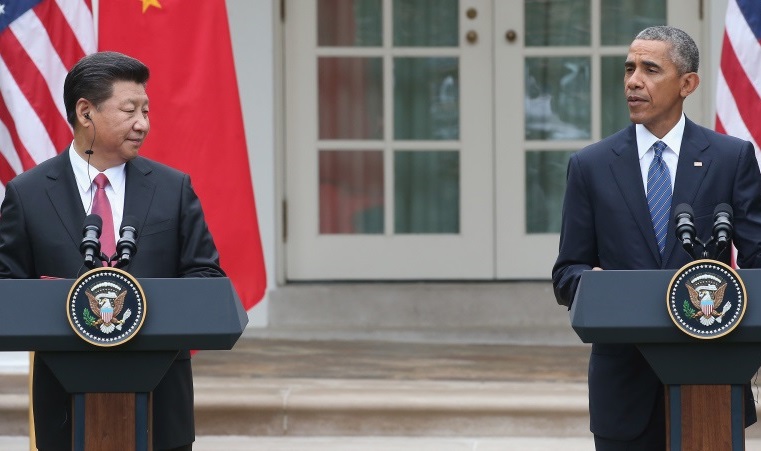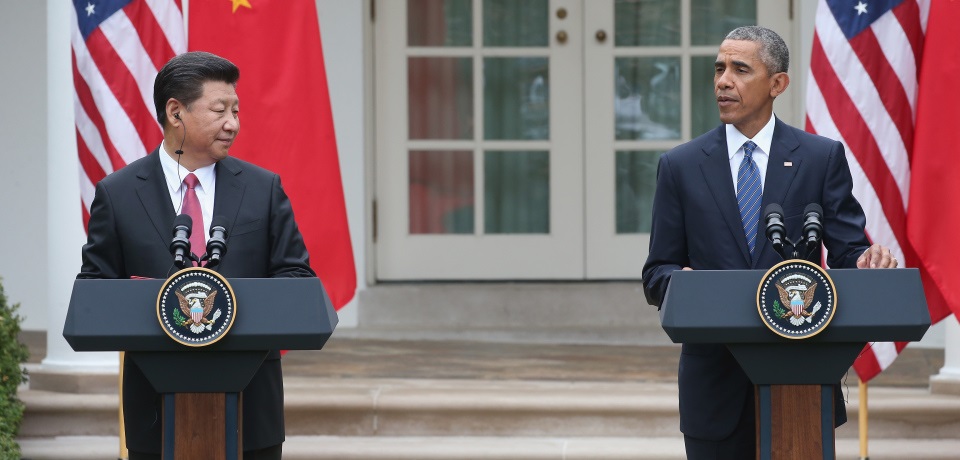|
 |
|
| 歐巴馬宣布「百萬強計畫」:到2020年有100萬名美國學生學習中文 |
|
| 作者:鄧媛 編譯 | 2015/9/27 6:40:51 | 浏览:2387 | 评论:0 |
|
|
|
|
|
Obama just announced a new initiative promising just that — and all by 2020.
- By Bethany Allen-EbrahimianBethany Allen-Ebrahimian is an assistant editor at Foreign Policy. She spent four years in China before joining Foreign Policy and holds a master's degree in East Asian studies from Yale University.

When U.S. President Barack Obama announced the 100,000 Strong Initiative in November 2009, setting the goal of sending 100,000 American students to study in China by 2014, it seemed like a lofty aspiration. In the 2008-2009 academic year, only 13,674 American students studied abroad in China. But that number rose steadily over the next five years, with help from private donations and Chinese government scholarships, and in July 2014 Secretary of State John Kerry announced that the goal had been met.
Now the American president’s back with an even bigger goal and one closer to home. On Sept. 25, in a joint press conference with Chinese President Xi Jinping, who is wrapping up an official state visit, Obama announced the launch of “1 Million Strong,” an initiative that aims to bring the total number of stateside learners of Mandarin Chinese to 1 million by the year 2020. “If our countries are going to do more together around the world,” said Obama, “then speaking each other’s language, truly understanding each other, is a good place to start.”
One million may seem like a lot, but it’s just under 2 percent of the total number of U.S. students; in fall 2015, there were about 55 million students enrolled in U.S. public and private primary and secondary schools. Still, there’s much catching up to do. “Estimates suggest that between 300 and 400 million Chinese students are learning English today, while only about 200,000 American students are studying Chinese,” Travis Tanner, senior vice president and chief operating officer at the 100,000 Strong Foundation, told Foreign Policy in an email. “We must bridge that gap.”
The new program, administered by the 100,000 Strong Foundation, a nonprofit that also oversees the 2009 initiative, recognizes the growing importance of the U.S.-China relationship and aims to prepare a new generation of U.S. leaders to engage effectively with China.
Increasing the number of American students who study Mandarinwill “create a pipeline of China-savvy employees in a range of fields” Increasing the number of American students who study Mandarin will “create a pipeline of China-savvy employees in a range of fields” and, Tanner remarked, will “ensure our trade relationship with China continues to benefit the American economy and that the future generation of American entrepreneurs, business owners, journalists, engineers, scientists, doctors, as well as government officials at both the national and state levels, understand China.”
The new initiative also aims to create a standardized national Chinese curriculum, flexible enough to allow for adaptations at the local school board level but comprehensive enough to prepare students for the AP Chinese-language exam and later advanced study. One Million Strong will also promote advances in language-learning technology and online instruction, promote investment in teachers colleges, and establish a consortium of governors who support Mandarin learning in public schools.
Such a huge goal, of course, also comes with huge challenges, not the least of which is funding. Though both Presidents Obama and Xi have endorsed the initiative, it will rely primarily on private funding, according to Tanner, who hopes that the official state-level endorsement will “inspire” financial support from “individuals, organizations and corporations.”
Attempts to bring Mandarin into the classroom haven’t been free from controversy in the past. China’s own huge soft power initiative to increase Mandarin learning around the globe, the Confucius Institutes, also operates primary and secondary education initiatives called Confucius Classrooms, which receive Chinese government funding. There are 357 such classrooms stateside, according to Chinese government data. But according to a January 2011 CNN report, community members in school districts in Ohio and California objected to the use of Chinese government funds to provide instruction to American students, with one calling it “communist propaganda.” A domestic push to increase Chinese-language instruction and adopt a nationally accepted Mandarin curriculum may help depoliticize the issue.
The importance and practicality of mastering Chinese has lately become more apparent. When Facebook founder Mark Zuckerberg met with Xi during the president’s recent visit to business and technology leaders in Seattle, the founder held a conversation with the Chinese president entirely in Mandarin.(Facebook is blocked in China and would benefit handsomely if allowed to operate there.)
“This is such an inspiring example of how important linguistic and cultural understanding is to enrich U.S.-China relationships in business and beyond,” said Jessica Beinecke, founder of Chinese-language learning platform Crazy Fresh Chinese. “Zuckerberg’s a busy guy. If he has time to learn Mandarin, so do American high school students.”
歐巴馬總統25日在與中國國家主席習近平召開的聯合記者會上宣布了「百萬強計畫」,設定了到2020年有100萬名美國學生學習中文的目標。歐巴馬表示,「如果國家之間在今後會有更多合作,那麼學習對方的語言,是真正互相了解的一個開始。」
「外交政策」(Foreign Policy)雜誌說,當歐巴馬在2009年11月宣布「10萬強計畫」,預設到2014年有10萬名美國學生到中國求學時,這個目標似乎在當時看來定得有些太高。在2008年到2009學年,僅有1萬3674名美國學生到中國學習,但隨後五年,數據明顯穩步提高,在私人捐款和中國政府獎學金的支持下,在2014年7月,國務卿柯瑞宣布2009年的「10萬強計畫」目標已經達到。
100萬這個數字看似很大,但它實際只占全美學生人數的2%。2015年秋季註冊美國公立和私立學校中的小學和中學生人數為5500萬。「10萬強基金」的高級副總裁和首席執行長譚納(Travis Tanner)在寫給「外交政策」的一封郵件中指出,「估計約有3億到4億的中國學生在學習英文,然而僅有20萬美國學生在學習中文,我們必須要縮小這個差距。」
新的「百萬強計畫」認識到了美中關係的日漸重要性,旨在培養新一代未來美國領導人能夠更加有效地和中國交流,譚納表示,增加學習中文的美國學生人數可以「培養更多領域的中國通員工,保證中美貿易繼續促進美國經濟發展,讓未來的美國企業家、商業業主、記者、工程師、科學家、醫生和政府官員都能更加了解中國。」
新的「百萬強計畫」將設計出更加標準和靈活的中文課程供不同階段的學生學習。
|
|
|
|

















